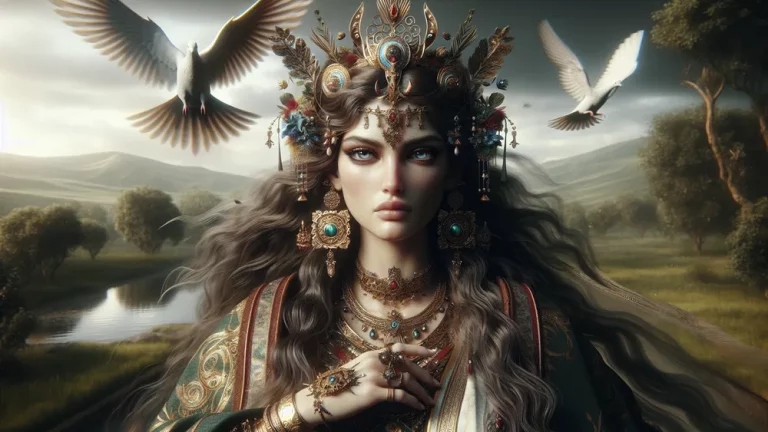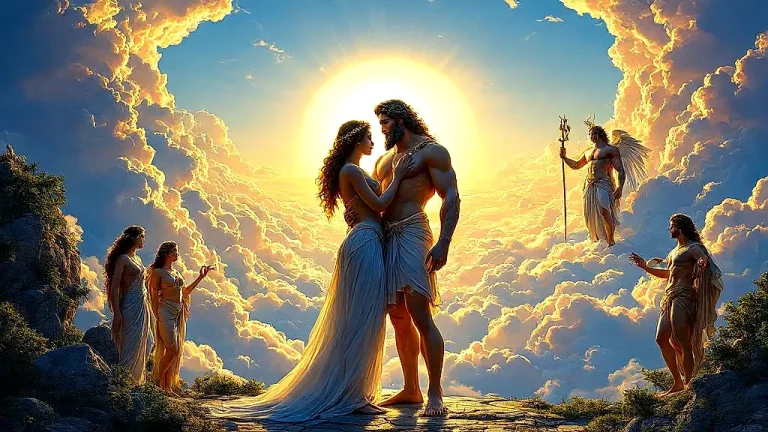Iapetus: Greek Titan Of Mortality And Father Of Prometheus
Out in all the tales of Greek times, the Titans are some of the biggest heroes, kind of like a group of huge guys who ran the universe before the Olympian gods got there. Among these old characters, Iapetus takes his place, often tied to the idea of death and our human situation.
Key Points:
- Iapetus is a Titan linked to death and human limits.
- He is the father of well-known figures like Prometheus and Atlas.
- Iapetus was born to Uranus (Sky) and Gaia (Earth).
- He participated in the Titanomachy, a major battle against the Olympian gods.
- His children represent different ideas, like Prometheus’s foresight and Atlas’s strength.
- After losing the battle, Iapetus and the Titans were imprisoned in Tartarus.
- Iapetus symbolizes mortality and the limits of human life.
Think of the TITANS as a first group in a big space story, each of them having parts and tales that touched the myths we see new today. Iapetus, being one of the twelve Titans born to the first gods Uranus (Sky) and Gaia (Earth), isn’t only just another person in this big story.
His story is really mixed up with people’s destiny, mainly through his kids, who are some of the well-known ones in these old tales, like Prometheus, who is famous for giving fire, and Atlas, known for holding up the sky.
As you go through these words, you will get to know the start, tales, and the lasting power of Iapetus to understand how this Titan’s tale has hit the stories and legends holding our thoughts.
Iapetus: Overview and Key Facts
| Important Part | Info |
|---|---|
| Name | Iapetus |
| Parents | Son to Uranus (Sky) with Gaia (Earth) |
| Brother of Titans | Oceanus, Coeus, Crius, Hyperion, Theia, Rhea, Themis, Mnemosyne, Phoebe, Tethys, and Cronus |
| Role in Stories | Linked to death and human limits |
| Famous Children | Prometheus, Atlas, Epimetheus, and Menoetius |
| Signs and Meaning | Stands for certain death and limited human life |
| In Myths | Took part in Titanomachy, which was a big fight between Titans and Olympian gods |
| Influence and Memory | Seen through the tales of his kids, especially Prometheus and Atlas |
| How He’s Seen | People see him as strong and old, really basic universe forces |
The Beginnings of Iapetus
In knowing Iapetus’s roots, seeing his spot in Greek myths means looking into where he came from and the family ties influencing what happened to him. In addition, understanding the beginnings and stories from his past helps shape his ongoing influence.
How Iapetus Came to Be
As a big family in the sky, the Titans included Iapetus as one very important person in this heavenly family line. Born to Uranus and Gaia, both strong forces like the sky and earth, he belonged to a mighty group of gods who started many stories. Think of these family links, which help you see his relatives and their big parts in myths:

- Oceanus: Said to be the big river around the world.
- Coeus: Seen as smart and the piece of heaven where stars move.
- Crius: Tied to stars and time of year.
- Hyperion: Connected to light and sun.
- Theia: Known for seeing and the light in the sky.
- Rhea: Mother to the gods like Zeus and Hera.
- Themis: Known for order and rules.
- Mnemosyne: Connected to memory and mother to Muses.
- Phoebe: Linked to the moon and a famous oracle.
- Tethys: Related to sea’s flow.
- Cronus: The youngest, who led change and parented the Olympian gods.
This big group made way for Iapetus’s offspring, with his children becoming central in stories of gods and men.
Iapetus, a key figure in the Titan family, is connected to many important gods and myths through his powerful parents, Uranus and Gaia, and his own children who played significant roles in stories of gods and humans.
Iapetus in Greek Stories
Thinking of the big picture in Greek myths, Iapetus’s influence is big, not just among the Titans, as it means much to human lives. You might see Iapetus as standing for death, explaining what people are like, but more than that, his link to death is not a small part; it strongly affects people’s fates.
Like a leader who sets a play’s path without being seen on stage, he impacts through his children, especially Prometheus. Prometheus did something big by giving fire to humans, which means fighting against what people cannot do. Iapetus’s part in myths means we cannot avoid death and life is not endless, ideas that are deep in his family’s tales.
Through these stories, his memory lasts, and people think about the fine line between gods’ power and humans’ weakness.
Iapetus’s Kids and Their Influence
After considering Iapetus’s part in Greek myths, time to see his notable kids. When we look, each of them had a lasting effect on stories, changing how things happened to gods and people too. They were important.
Prometheus: The One Who Brought Fire
Think of someone today challenging a big company to give a new technology to people. This is like what Prometheus’s act was in Greek tales. Prometheus, the son of Iapetus, was known for smartness and seeing ahead. His most well-known action, stealing fire from the gods and giving it to people, meant more than warmth and light. It gave them a way to grow, build tools, and live better lives.
His sharing this power with people was a big challenge to Zeus, who was the top god and wanted to keep people weak. Time went by, and his punishment was long and painful. Zeus’s harsh response, tying him to a rock where an eagle ate his liver every day, was severe. It grew back each night, so the pain was constant. This suffering means the control and authority gods had.
Still, Prometheus’s story continued, and it made people think about fighting for knowledge. His legacy showed the ongoing push between control and the need to learn more, a theme seen through the ages, and it inspires and challenges even today.
Atlas: The Sky Holder
Think of Atlas as the biggest sign of strength, with the huge job of holding the sky, which means having the weight of everything above. Atlas, another of Iapetus’s sons, has a story of power and holding strong. Because he chose the Titans’ side in the big fight against the Olympian gods, known as the Titanomachy, Zeus made him stand on the far side of the Earth to hold up the heavens. He stayed there forever. In myths, he often appears, and this makes Atlas’s job important in Greek tales. Here are parts where Atlas is in myths:
- The Twelve Labors of Heracles: In this myth, Heracles asks Atlas for help to get the special apples.
- Perseus and Medusa: Some tales have Perseus meeting Atlas and using Medusa’s head to turn him to stone, creating the Atlas Mountains.
- The Titanomachy: He was in the battle against the Olympians, a fight that led to his endless punishment.
In the end, Atlas’s strength is clear in these tales, with the ideas of power and having heavy loads in his story.
Epimetheus and Pandora
Consider if you got an unknown box with clear rules not to open it, yet the need to know was too much – this is what the Pandora story means, with Epimetheus having a vital part. Epimetheus, Prometheus’s brother, is often known for not seeing ahead, a trait unlike his brother’s wisdom. In tales, he got the job of taking Pandora, the first woman created by the gods, as a gift for people.

He was warned by Prometheus but still took Pandora, who brought a box with all the world’s bad things. When Pandora opened it from curiosity, she unleashed suffering and sadness on everyone, leaving just hope inside. This tale means the ideas of seeing ahead versus looking back, as Epimetheus’s quick choice led to big surprises, showing why thinking ahead is important.
Through this story, Epimetheus’s part is a lasting message of the balance between wanting to know and being careful.
The story of Pandora illustrates the clash between curiosity and caution, highlighting how Epimetheus’s hasty decision led to unexpected troubles while leaving hope as the only good thing.
Iapetus’s Part in the Titan Clash
After looking at the important roles of Iapetus’s children, our focus is now on Iapetus’s role in the Titan and Olympian clash.
The Great Titan Battle
Picture a huge family fight, where the older Titan gods find themselves up against the younger Olympians in a fight for control over everything. This really big fight, called Titanomachy, was a big moment in Greek myths, going on for about ten years and changing the divine order.
The Titans, led by Cronus, wanted to keep their old regime, but Zeus led the Olympians who wanted to start a new era. The fight’s field was the universe, where lightning clashed with basic forces, while everything shook under the battle’s weight. Iapetus stood with the Titans, as he used his power against the new Olympian force. His part in this war means the idea of the Titans’ fight against change.

Among the Titans, Iapetus, a strong figure, stepped into this huge fight, which meant the old ways standing against new ones. But then, despite their strength, the Titans were outsmarted by the Olympians, who had the Cyclopes and Hecatoncheires helping. These allies gave Zeus powerful weapons, like his big thunderbolt. This was crucial. The Titan defeat meant the end of their time and the start of the Olympian age.
Iapetus and the other Titans were thrown into Tartarus for rebelling. The story means ideas of old against new and change that can’t be stopped; and it also means the lasting stories of people like Iapetus, still capturing attention.
What Happened After and Iapetus’s End
Imagine what it’s like for a strong leader before who lives in a dark jail now, without power – this was reality for Iapetus and his Titan friends after losing in the Titanomachy. After the Olympians won, Zeus decided that Titans must be locked up in Tartarus, a deep hole under the world, made for gods’ toughest enemies.

Living there was almost like getting a life sentence, where Titans, who ran everything, were now tied up, their power just memories now. Tartarus was not only some huge jail but a symbol of how Titans dropped down and where they couldn’t fight back against the new rules made by the Olympians.
For Iapetus, this marked the end of his part in myth stories, as he, with his brothers and sisters, became a warning tale about trying to fight gods. This change from power to prison means ideas about arrogance and the shift in power in Greek myths.
The Meaning and Influence of Iapetus
After we looked into the big fall of Iapetus and the Titans, our focus shifts now to get the deeper symbolism and see the lasting impact of Iapetus in myths.
Iapetus as a Sign of Mortality
Think about how Iapetus, one of the original Titans, represents the idea of mortality and the built-in limitations of being human. In Greek myths, Iapetus often appears connected to the end of life, a theme that we see through his children, like Prometheus and Epimetheus. As a sign of mortality, Iapetus is a reminder of the end that happens to all, much like watching time go by.
This idea not only reflects human life but also comments on the limitations even gods must accept. By meaning mortality, Iapetus makes clear the differences between forever gods and short-lived humans, a theme repeated in many Greek stories.

In this way, to understand what Iapetus means, it helps to compare different Titans’ qualities, each standing for different life’s parts. The table shows these differences:
| Titan | Symbolism | Key Attributes |
|---|---|---|
| Iapetus | Mortality and Limitations | Father of Prometheus, foresight |
| Cronus | Time and Harvest | Father of Zeus, ruler of Titans |
| Oceanus | The Ocean and Boundaries | Encircles the world, vastness |
| Hyperion | Light and Observation | Father of the Sun, Moon, Dawn |
The table makes it clear how each Titan stands for unique universe parts and human experiences, with Iapetus especially representing the finite nature of life. Through these stories, Iapetus’s impact goes beyond myths, offering a clear view on human life and the truths of living and dying.
Iapetus in Other Legends
Think about the links between Iapetus and figures from other stories, like the Norse giant Ymir or the Egyptian god Osiris, each stands for basic parts of their myth worlds. In Norse myths, Ymir is a very early being whose body forms the earth, much as Iapetus is a basic figure among the Titans, meaning the building blocks of life and death.
Similarly, Osiris in Egyptian tales is linked with life, death, and coming back, which is much like the way Iapetus means mortality and the end all beings meet. These comparisons point out a common idea across cultures: exploring life’s limitations and the powers that shape human life.

By looking at these mythological figures, we see how different cultures have dealt with similar life questions, each making stories that reflect their world view and understanding of humans.
Greek Titans Family
Think about the branches of an old family tree, where each branch stands for a powerful figure in Greek mythology – the Titans. These very old beings, as the children of Uranus (Sky) and Gaia (Earth), form the basis of many myth stories. Each Titan has a unique role in shaping the universe. For example, Cronus, ruler of the Titans, and Oceanus, who goes around the world.
Their influence is big. Their stories mix with those of the gods like Zeus and Hera, making a detailed collection of myth stories. For anyone wanting to see more about this important family, there is a full list with all Greek Titans where you can read their stories and what they did in Greek myths.
FAQs
1. Who were the parents of Iapetus?
The parents of Iapetus were Uranus, the personification of the Sky, and Gaia, the personification of the Earth.
2. What is the significance of Iapetus in Greek mythology?
The significance of Iapetus in Greek mythology lies in his representation of mortality and human limitations, as well as his role as the progenitor of influential figures like Prometheus and Atlas.
How Iapetus influenced his children is evident in their embodiment of his traits, such as Prometheus’s foresight and defiance, Atlas’s endurance, and Epimetheus’s lack of foresight.
4. What role did Iapetus play in the Titanomachy?
The role Iapetus played in the Titanomachy was that of a combatant on the side of the Titans against the Olympian gods.







